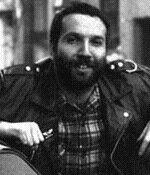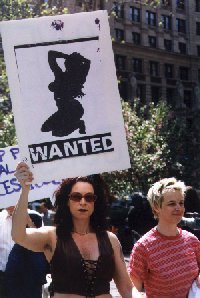 |

|
|
|
|
News Brief: Over 300 gay, lesbian, bisexual and transgender activists recently debated issues ranging from media accounts of public sex to the failure of national and local gay groups to consider sex issues a part of their liberationists' mission. Convening in Pittsburgh, Pennsylvania, during the weekend of the National Gay and Lesbian Task Force's Creating Change Conference (November 13-15), the collective of women and men organized a full-day summit, two action planning meetings, and three public workshops which were follow ups to last year's now infamous Sex Panic Summit in San Diego.
 Tony Valenzuela, the lead organizer of the 1997 Sex Panic Summit who
continued as part of the 1998 collective said, "Even though we endured a year
of media mistreatment and willful misrepresentation by people who disagree
with our efforts, this year the tone at Creating Change was clearly pro-sex.
Tony Valenzuela, the lead organizer of the 1997 Sex Panic Summit who
continued as part of the 1998 collective said, "Even though we endured a year
of media mistreatment and willful misrepresentation by people who disagree
with our efforts, this year the tone at Creating Change was clearly pro-sex.
Marla Stevens, a collective member, is Director of Public Policy for LGBT Fairness Indiana, where she routinely works on police entrapment issues. "Sex brought this movement together and gives it passion. You can't talk effectively about marriage and family issues without talking about sexual liberation." In addition to Read, Valenzuela and Stevens, the organizing collective was comprised of Chris Bartlett of Philadelphia, Julie Boler from North Carolina, Jeff Montgomery of Detroit, Eric Rofes from Maine, Donald Hall of Los Angeles, and Keith Griffith of Massachusetts. Eric Rofes' Speech Building a Movement for Sexual Freedom During a Moment of Sex Panic By Eric Rofes A Keynote Address given at The Second Annual Summit to Resist Attacks on Gay Men's Sexual Civil Liberties November 13, 1998 Pittsburgh, Pennsylvania
1. The repeated failure of most national and local gay groups to consider sex and sexual freedom as a central part of their agenda; 2. A rising anti-sex fervor in newspaper articles and books written by self-identified gay men; 3. A growing response to continuing HIV infections among gay men by many AIDS organizations and gay leaders which was marked by an acceleration of strategies heavily dependent on moralizing, hysteria, and shame. We called our meeting the National Sex Panic Summit and that weekend we made valuable connections, grappled with key theoretical questions, and educated ourselves about the history of moral panics during this century. Isolated organizers working in different parts of the nation met new comrades. We debated the distinction between ongoing patterns of harassment and an escalating moral panic. We spent endless hours drafting and debating a document called "A Declaration of Sexual Rights" linking the history of our movements with the current attacks on sexual self-determination. In short we did organizing work: the good, hard, grunt work required to define an issue, ignite activism, and begin to chart out an agenda. We did this work under stressful conditions. The National Gay and Lesbian Task Force appeared embarrassed by our presence and its leaders trivialized our concerns. A number of mainstream gay and lesbian activists accused us as undercutting efforts to achieve gay marriage, protect the rights of gays in the military, and promote a portrait of gay men as repentant and chaste. A few leading progressive organizers saw our work as simply a patriarchal attempt to win more sexual privilege for men and understood our efforts as about dick-dick-and-only-dick rather than about social change and human freedom. The Backlash of 1997 None of us were prepared for the backlash we would face in the weeks and months following the summit. Our modest organizing efforts became the focus of a million news stories, editorials, and opinion pieces which misrepresented who we were, mischaracterized our work of the weekend, and willfully mislead the public about our politics and our vision. The lead organizer of the summit—Tony Valenzuela—was pilloried in the local and national press and positioned as our summit's sacrificial lamb.
 In an action reminiscent of those of the McCarthy
period, the president of the Log Cabin Republicans issued a very public
call demanding every national gay organization publicly distance
themselves from our summit and denounce our efforts.
In an action reminiscent of those of the McCarthy
period, the president of the Log Cabin Republicans issued a very public
call demanding every national gay organization publicly distance
themselves from our summit and denounce our efforts.
Our small gathering became the focus of the lead news story in that week's New York Times section "The Week in Review," where we were mocked and derided as sexual renegades, diseased pariahs, and a throw-back to the 1960s. I understood the backlash in two primary ways. First,.we'd committed heresy. By daring at the public level to value sex, pleasure, and the benefits which emerge from our sexual cultures—and to argue that the Monogomites have no corner on the market on ethics, values, or morality—we broke ranks with the gay rights movement's primary strategy of assimiliationist politics and showed it for what it really is: a bankrupt, Faustian bargain which opts for a narrow package of concessions rather than authentic human rights, privileges cultural conformity rather over cultural pluralism, and affirms the status quo over the status queer. The second way I understood the backlash was that we had hit a nerve, pushed a button, unleashed a fury which Freud might call the "return of the repressed." By discussing sex openly and explicitly, and by publicly discussing anal sex as a valuable, meaningful act for many gay men, we shattered a powerful taboo which had taken root during the crisis years of the AIDS epidemic. We'd become accustomed to expecting fags to maintain a public silence about the wide discrepancy between the ways many AIDS groups publicly represented gay men's sex lives, and what we knew was really occurring in gay communities throughout the nation. To hear a young man talk about getting fucked and taking semen up his butt, without the usual expressions of horror, regret, or "I've learned my lesson!", was more than many people could stand. We shattered the silence and punctured a lie that was the foundation upon which so many people constructed their public identities as "respectable" gay men during this gay rights era. By standing as examples of gay men who appear before the public unapologetically as neither members of monogamous gay couples nor de-sexed celibates sacrificing personal lives to the demands of community work, we achieved a bad-boy status among those who continue to grovel before a community self-image as the best little boys in the world. Hence last year's sex summit achieved what we set out to achieve. We met one another and began to share strategies, tactics, and organizing tips. We supported each other personally and professionally to continue our principled work in gay communities even as the social supports for our politics and our visions continued to erode. And, perhaps most importantly, we created an alternative voice within gay male communities, a critical voice of resistance to the demonization of gay men's sex. During an era when many forces discourage from speaking out those who believe in the power of the erotic as a central component of social change, we found a way to assert our vision and our values into the community dialogue. The Challenges We Face in 1998 We come together this weekend, just one year later, to continue our efforts to transform the position of sex and desire in gay men's communities. I know how difficult this work is today.
Have no illusions: those of us in this room do not share a singular vision, nor do we agree on a range of controversial issues related to our work. But we are here because we have chosen to continue the work of sexual liberation during a time of increasing repression, escalating moral panic, and the return of sexual shame. My aim for us today and this weekend is three-fold. I want to show those who thought a media-trashing would destroy our efforts and force us underground, that we are here for the long haul and will continue to do the methodical, plodding work of building a resistance to their narrow, misguided agenda. We are not going away. I also want to show that—contrary to what our critics say—many of us do this work out of a commitment to gay men's health. Over half of the collective organizing the summit this year works each day to improve the health and safety of gay men—at AIDS and public health organizations, gay community centers, and gay men's health projects. We believe the use of shame, terror, and punishment as central tools of disease prevention is a key cause of men's alienation from their bodies and desires. We have no doubt that our work at this summit focused on empowerment will contribute to improving the sexual health—and the mental and spiritual health—of gay men. My final aim for this summit is for us to find a way to break through the barriers that prevent us from successfully organizing our resistance in every part of this country. We must consider seriously the profound roadblocks we face doing this kind of work at the current cultural moment. I want us to share tactics, lessons learned, resources, and bright ideas which will help us create savvy organizing responses and mobilize a mass movement in support of sexual civil liberties and the rights of all people to organize their sex and relationships outside traditional family values. To achieve these ends, it's important for us to think back over the 12 months since we last convened and assess the state of sex panic facing gay men throughout the nation. I want to highlight critical incidents and what I consider to be the central core issues emerging in 1998 and I want to suggest some lessons we might take away from specific case studies of our organizing efforts. So settle back in your seats and let me take you on a highly-subjective tour of the past year. Four Core Issues I want to start by flagging four core issues which have seized center stage during the past year. When we last convened, New York City was in the throes of a major effort led by Mayor Giuliani to rid the city of commercial sex businesses. We debated whether New York was experiencing the usual ongoing harassment and crackdowns or whether a sex panic had emerged. l"> Over the past 12 months I believe it is clear that a multi-pronged, and amazingly pernicious attack on sexual freedom has occurred to benefit commercial real estate interests and a smug, moralistic mayor. While New York's Sex Panic group continued to meet and organized several effective actions and public education campaigns, pro-sex forces have faced tremendous barriers, splintered and lost membership at precisely the moment of most urgent need for resistance. Many have understandably feel dispirited and pessimistic about the potential to hold the line against the police, zoning boards, media hacks, and politicians. As the situation in New York City continues to intensify, I believe it is appropriately understood as the key urban site of moral panic in the nation today.
Many chose the "sexual predator" angle and insisted they were coming to the defense of innocent children. The leading trade publication for television producers which annually creates a list of hot story ideas, fanned the flames by suggesting TV news shows run pieces on public sex in their local areas. These journalistic forays into the "underworld" of men's sex cultures, have been an explosive challenge for local organizers. The third hot issue—and one with which all of us must grapple, however difficult it may be—involves the escalation of attacks on adult men involved in consensual relationships with young men in their teens. I am talking here about 22 year old men imprisoned for having sex with 16 year olds, the profound ramifications which homophobic enforcement of age of consent laws have on gay male youth isolation and identity-formation, and the escalating campaigns which criminalize and demonize a very wide range of people, relationships, and behaviors under the guise of protecting "childhood innocence." In an era in which Megan's Law is used not only to persecute gay men who got busted for bathroom sex 30 years ago, but also non-violent adult men who formed consensual relationships with sixteen year old gay-identified youth, we have to recognize that the moral panic facing gay men is not limited to bathroom cruisers, circuit boys, or sex workers. The hysteria surrounding this issue has led to life-time parole or extended sentences for some sex offenders who already have served their time in prison, sweeping new censorship laws, mandatory reporting laws that turn health providers and counselors into arms of the state police, and efforts to perpetually hound sex offenders who had served their prison time out of jobs and housing anywhere in the nation. Because the "save our children" rhetoric is a powerful tactic in a range of sex panics, I believe it is time—perhaps past time—to open dialogue with gay men and others who have been organizing in this important arena. Finally, we must look at the ways in which current panic surrounding HIV is leading to repressive measures against sexually-active people with HIV, measures we fought long and hard to defeat just a decade ago. What does it mean, during a moment in which many gay men no longer experience AIDS as a crisis, that communities of color and indigent populations are hit with the passages of laws which gay men successfully resisted a decade ago? A legislative backlash has instituted laws which report the names of people with HIV, notify partners, and imprison people with HIV who engage in unprotected sex. Why are some white gay leaders who lead the opposition to such laws a decade ago, now the leading advocates for such laws? What are the implications of these new laws for the sexual freedom and civil liberties of people with HIV—including gay men with HIV, including gay men of color with HIV? Key Successes of 1998 I want to highlight a number of successes we've achieved this year because I believe, as Saul Alinsky frequently insisted, "We need wins." I choose to highlight three efforts here where gay men—through a process of grassroots, collaborative organizing—brought about some key victories which offer lessons for all of us. First I want to highlight the work of a small group of gay male health workers in Portland, Maine. In March, shortly after the citizens of Maine became the first state to repeal a statewide law protecting people from discrimination on the basis of sexual orientation, the police chief, perhaps sensing an opportunity to strengthen morality codes, put forward a proposal to the city council for an ordinance that would criminalize and crackdown on consensual, out-of-view sexual activity, the kind of activities that may occur in a car or a dark corner of a dance club.
What also worked here was that a critical mass of gay men who felt no shame about their sex and the sex cultures of their community, pulled together quickly, did the grunt work of organizing, and then celebrated a victory. The second achievement I want to highlight is the important work done by a small group of health activists at this year's National Lesbian and Gay Health Conference in San Francisco. I was a member of this group and we wanted to create a presence at this key national event which was different from the organizing-in-exile we are forced to do around Creating Change. By working collaboratively, paying attention to the details of organizing and marketing, and building bridges to people with whom we agree 80% of the time, rather than making them into "the enemy," we were able to shift the conference discussions about gay men's sex and drug use away from the punitive, just-say-no approach so popular these days among anxious, exhausted health providers, and towards more complicated understandings of issues such as barebacking, muscles, circuit parties, and public sex. We raised the level of public discussion up several huge notches. Third is the truly impressive work done in Detroit by the Triangle Foundation and its attorneys. By forming an active and aggressive strategizing group comprised of lawyers—including former prosecutors—activists, and former victims of entrapment, the group has staged informational outreach programs at rest areas and parks, met with police officials, waged a savvy media campaign to counter the police rhetoric on public sex, and begun to put together ground-breaking legal challenges to entrapment. This energetic and principled group have been able to prevent legislation aimed at censoring the Internet, halt the use of Megan's Law for men entrapped at public sex venues, and put on trial the entrapment practices of the police and the moral panic practices of the media. What's especially wonderful about the work of the Triangle Foundation is that thanks to the leadership of Jeff Montgomery, we are able to witness a single mainstream gay organization which, in 1998, has taken on entrapment and sexual civil liberties as a key part of its agenda. What's also impressive here is that people occupying a range of positions which carry some stature and hence some risk—attorneys, executive directors, community organizers—were willing to put themselves on the line and stand up for what they believe. By forging a working group with a commitment to ending entrapment, I believe the Triangle Foundation offers us a model which should be adapted to local gay male communities throughout the nation to address not only entrapment, but also sex club closures, media moral panics, and the overarching moralizing suffusing our communities. I also want to flag for you some of my personal heroes and heroic events of the past year because they show how individual gay men—and key community organizations—can make a valuable contribution to our efforts to resist shaming and sexual repression. Here I think of Edmund White who published a piece in an otherwise awful issue of The Advocate which offered no apologies for a lifetime of promiscuity and nailed sex-negative critics for their contradictions, self-delusions, and mendacity. I think of Michael Bronski, whose new book The Pleasure Principle, cuts to the heart of our culture's sexual repression and should be required reading for all activists for sexual freedom.
I also want to highlight the work of a group of Boston-area educators, health activists, criminal justice workers, and organizers who have crafted a thoughtful and powerful statement called "A Call To Safeguard Our Children and Our Liberties," which begins to tackle the 'Save Our Children' construct and confront the real challenges facing children and youth in our nation. Finally I want to highlight my celebrityl hero of the year, George Michael, who responded to his very public entrapment by not only coming out of the closet (finally!) as a gay man, but by appearing on television talk shows unashamed and unrepentant, and for producing a new single and a video titled Outside which is a powerful statement affirming sexual freedom and denouncing police repression. Dangerous Trends Perhaps it would be useful to point out two other dangerous trends which we've faced this year. First I want to highlight the continuing challenge we face working on sex issues not only with the mainstream media, but with the queer press as well. The Advocate continues to lead the way, sensationalizing gay men's sex to sell papers, and encouraging readers to link public sex, fetishism, and multipartnerism with danger, disgrace, and disaster. They are not alone. Yet the winner in this year's contest for most horrifying commentary in the gay press must go to columnist Jennifer Vanasco who used the suicide of a gay man in Arkansas after he'd been outed in the local paper for public sex, to express her "happiness" that such men get busted, applaud the use of shame and disgrace as methods of policing, and blame the victim for his own demise. Showing no knowledge of the long history of such suicides or the unequal enforcement of public sex codes, and no empathy for the dead man, Vanasco reaches her lowest point when she insists, "Lesbians should get a big chuckle out of the idea that these men have sex in public because they're oppressed," and attempts to create a wedge between lesbians and gay men. It takes every bit of my will to resist saying, "Vanasco: Shame on You!" The second dangerous trend is the rise of Sexual McCarthyism we've witnessed this year. This is a complicated matter and one which is linked to Kenneth Starr's public release of Grand Jury documents about the President to the media. I use the term "Sexual McCarthyism" as sort of a dangerously misguided extension of "outing." In this case, you don't out someone's sexual orientation, you out their sexual interests, activities, or desires. Just a month ago, a New Hampshire paper linked a state Democratic leader in a legislative race to defeat an incumbent Republican to a gay organization which sponsors "leather nights" and "rubber orgies." The paper attempted to defeat Rick Trombly by portraying what they suggested were his "quaint homosexual fetishes." In this case, it didn't work: with 94% of the vote in, Trombly was ahead of his opponent with 52 to 48% of the vote, and I believe he won the race. No suicide, no disgrace, no defeat. In Lawrence, Massachusetts, a local paper outed a member of the city's school board for engaging in Internet searches for a three-way with his girlfriend. He was forced to resign his post. This is Sexual McCarthyism. On hearing that a gay male watersports club was planning a Palm Springs weekend of parties, local officials in Cathedral City unsuccessfully attempted to ban the Waterboys from their area. This is another form of Sexual McCarthyism. Activists for sexual freedom might argue that if sexual diversity is good, what's wrong with outing an individual's fantasies, sexual practices and kinks? Perhaps we should all walk around with our desires printed in black marker on our forehead? Perhaps it's okay to "out" the contradictory practices of our opponents? One sex activist in San Francisco sent a public letter to newspapers and zapped it out over the Internet after he saw a city official who'd opposed the opening of a bathhouse in San Francisco at a local porn theater. When I visited Provincetown this summer, tongues were abuzz because a popular writer who embraces marriage and neo-conservative morality supposedly had spent his vacation in leather bars and on the Dick Dock. When a Board member at GMHC died recently, a local gay paper found it useful public health strategy to expose that he had died of a drug overdose, not AIDS, and use his particular circumstances to undermine the organization's credibility and deride their work. These are complicated matters. I don't pretend there are easy answers here. But I do fear that our organizing efforts will be hurt rather than helped if we feed into the frenzy to expose, embarrass, and publicly disgrace people on the basis of their sex. People on "our side" of these issues love to gossip about the supposed sex lives and imagined or real contradictions of those with whom we disagree. When I'm exhausted by these sex debates within our communities, I sometimes want to enumerate which lesbian activists cheat on their lovers, which executive directors love to be tied up, and which gay male public officials fetishizes specific body parts, races, or articles of clothing. But I resist this urge to use the tactics of the Right to further our progressive agenda, because at night, when I go to sleep, I have to face myself and be accountable for the tactics I've used. And ultimately, I want to celebrate all of our sex—from vanilla to kink—and not demonize specific interests and acts as part of a narrow, short-sighted agenda. Rather than respect our opponents' rights to their opinion and tackle their thinking head on, some of us mock their ambiguities and have no empathy for any conflicts they might have. I cite this here because I believe that Sexual McCarthyism is escalating and that those who stand to lose the most are those with transgressive desires. I encourage us to resist the urge to use such tactics and trust that those who disagree with us, do so primarily out of their intellectual position. Why Is Organizing So Difficult? There is much we can learn from less-than-successful efforts of the past year which force many of us to confront precisely how difficult it is to organize a resistance to attacks on sex and sexual cultures. It is important to realize how tough it is to do any kind of grassroots organizing these days on any issue outside the mainstream. Many of us like the identity of being community organizers but when the grunt work gets tiresome, when the conflicts between individuals get ugly, when racism, classism, and sexism divide us and leave us enraged and dispirited, many of us would rather stay home and watch Ally McBeal or South Park. So we retreat into roles as journalists, health workers, nonprofit managers, public officials, business people, and tell ourselves we're still doing activist work. There are many ways to contribute to social change, but there is a difference between grassroots organizing and writing a book. There is a difference between being an organizer and being a city councillor. I want to be a voice affirming the value and heroism of long-term commitment to democratic processes of community organizing. We may hate the endless meetings, be sick of licking envelopes, feel frustrated working across different identities and political visions, and be drained by community cannibalism, but we've got to continue doing the work. When the going gets tough, true organizers find a way to keep going. No one will give you rewards for your work, but social change cannot happen without old-time grassroots community organizing. There is a particular challenge these days organizing around sex.
 Because of the rise of Sexual McCarthyism—inside and outside gay
communities—the stigma of speaking out, defending principles, or
participating at meetings like our summit, is more than many people can
bear.
Because of the rise of Sexual McCarthyism—inside and outside gay
communities—the stigma of speaking out, defending principles, or
participating at meetings like our summit, is more than many people can
bear.
For some it's a matter of risk and cutting their losses. We all have to consider ways in which defending buttfucking or sex in parks sits alongside our current employment and our future job prospects. While I want to be a voice urging us to be bold, I also want justice-minded people to approach this work with open eyes and I trust each of us to decide what kinds of risks we can take. While we need to gently push each other to be courageous, we also need to withhold our judgements and accept that a range of legitimate factors besides being chickenshit, keeps many people from participating in this work. We must take this into account in our organizing. For others, the primary barrier to speaking out and organizing around sex issues is a five letter word: shame. Many people believe their desires are wrong, their turn-on's are sick, and the way in which they organize their sex is shameful. You might love sucking dick through a glory hole or spending hours in the AOL dungeon chat room, but not only do you not want anyone to know about it, but you won't ever take steps to fight for your right to continue to enjoy these activities. Just as the shame about being gay limited our movement in the 1970s to a handful of people willing to openly own their gay and lesbian identities, shame about getting fucked, licking boots, or good old vanilla promiscuity limits participation in efforts to support sexual freedom. A final major challenge to this work that I want to cite is the difficulty conveying messages about sexual liberation to a hostile media and a public—which increasingly includes a queer public—which hears of our work and thinks, "What planet are they on?" During an era where the Right has so successfully undermined and redefined concepts of liberty, freedom, and democracy, and the Left has run from issues of the body, desire, and sex, how do we frame our arguments in language which is neither esoteric nor trite. When sex has been so devalued and so demonized that placing the word "sex" alongside "freedom," makes many people smirk, how do we articulate our beliefs that promiscuity may be as moral as monogamy, that the right to choose an open relationship may be as ethical as choosing celibacy? A Strategy for 1999 The current cultural moment is ripe for our organizing efforts. Our work will be neither easy nor simple, but the public debates about the President's sex life has taught me a great deal about the American public's views of sex. I argue that the fact that the public has continued to support the President despite powerful attempts by Kenneth Starr, Newt Gingrich, and the mainstream media to discredit and shame him, has everything to do with our work of gay liberation of the past 25 years. We have been in the vanguard of insisting that people's right to hold jobs is independent of the way they organize their sex and relationships. We have argued that this separation is key to democracy and pluralism. While it is clear that the media has never embraced this position, I believe we've impacted the public in a major way. This gives me hope. Our work will not be easy. I find it ironic that Het Amerika may be becoming more open-minded on certain sex issues—and that the public clearly understands that marriage and sex are often complicated, untidy matters—just as gay communities are becoming increasingly narrow-minded. Alan Wolfe's recent sociological report on middle-class morality shows that an influential sector of the public is liberal and tolerant about all populations except lesbians and gay men. They believe sex is inherently dangerous, volatile and best kept private. This leads Wolfe to advocate for the de-sexing of homosexuality and spurs forward a Human Rights Campaign vision of gay people who prioritize faith and family over the alternative forms of organizing sex and kinship which are where most gay men live their lives. Our biggest challenge is finding a way to make sure groups which often were founded and built by transgressive queers—groups like GLAAD, and the National Gay and Lesbian Task Force, and Lambda Legal Defense, and local gay and AIDS organizations—continue to do some small amount of work which is risky, outside-the-box, and beyond-the-safe-and-status quo. I want to close this talk by suggesting four key directions for our organizing over the next year. First, creating a coalition of all of the different groups facing the threat of a moral panic over sex seems important to me. We must continue our internal efforts focused on gay men's communities, but we need to link up with allies organizing sex workers, pornographers, sadomasochists, and others, as well as those working for sexual and reproductive freedom for women. I believe next year's summit might best be conceived as a broad-based coalition effort where we play one small part. With this in mind, I offer two suggestions for our own continuing efforts. First, we must find a way to overcome or resolve powerful divisions within our group concerning entering coalition work with gay men organizing around intergenerational relationships. Second, we must examine why our efforts and our participation are so white, and how racism and whiteness together shape what we prioritize and with whom we work. Next, I recommend that we become involved in local efforts building towards the 50 state marches next spring and that we use these efforts as a way to create networks of activists who are working towards sexual freedom. At the very least, these marches must make the repeal of sodomy laws a top demand. We might use these marches to meet colleagues sharing a similar vision, or inject into the march some pro-sex visibility. Third, I believe that the work they've done in Detroit organizing an ongoing strategy and response group focused on entrapment and preserving gay men's sexual civil liberties should be replicated in every part of this country. During our work this weekend, I urge you to seek out folks from the Triangle Foundation, learn how they organized their resistance efforts, and consider folks in your hometown who might want to contribute to a similar ongoing effort in your area. I'd like to meet again a year from now and hear that there are at least dozen of "entrapment action groups" or similar efforts In different parts of the country. Finally, I want to encourage our work over the next year to continue to highlight prominently the linkage we see between sexual liberation, public health, and social change. Over the past 20 years I've worked on a range of gay men's health issues. I've written a book on gay people and suicide, directed a multi-purpose gay health center, led AIDS organizing efforts, and founded programs for gay youth. In every case, the repression of sexuality through guilt, shame, moralizing, and terror has been a major barrier to health promotion. There is no need to create a false opposition between health and freedom, sex and the spirit. Nor is there any need to pretend that sexual cultures do not face their own specific health challenges. Yet to allow those who advocate for the displacement of sex from a central position in gay cultures to represent themselves as health-minded and us as disease-promoting, is not only wrong, it is dangerous. Let our work this weekend continue to integrate a commitment to democratic freedoms, social change, and sexual health. Eric Rofes is the author of Dry Bones Breathe: Gay Men Creating Post-AIDS Identities and Cultures (Haworth Press, 1998) and is a veteran activist and community organizer shuttling between Maine and San Francisco.
One Part Sex, Two Parts Panic: a Recipe for Disaster By Kirk Read
The Sex Summit and its organizers forged ahead this year, determined to raise the issues ignored by most LGBT organizations. The weekend built on the success of last year's summit, which injected edgy discussions of sexuality into the dialogues happening at queer conferences all over the country. One of the hottest discussions at this year's Sex Summit was the prevalence of nationwide sting operations in public sex venues. Many thousands of men are arrested each year by undercover police, often during hidden camera collaborations between vice squads and local TV news outlets. TV stations call police and say "Let's put on a show" and cops go undercover to, as a Michigan police department puts it, "bag a fag." TV stations then hype the segments as the news every parent must watch to protect their children. When the pieces run during media sweeps week, stations are all but guaranteed a boost in ratings. It's textbook homophobia and D minus journalism. But activists are starting to fight back. Rural and urban activists shared their ideas about how to respond to the campaigns, since most state and national LGBT organizations refuse to address the issue. Several activists discussed bringing doughnuts to the hunky undercover officers who spend endless hours in bathrooms, enticing men by rubbing their crotches. Bad cop, no doughnut! Over 300 men, women, and creatively gendered folks came together in Pittsburgh to trade strategies and ideas around a variety of issues. Discussions varied from how to build alliances with women and people of color facing attacks on their sexuality to codes of ethics for promiscuous men. The latter panel featured a number of men in long term open relationships, discussing the negotiations they'd made to stay together, acknowledging that the married and monogamous model was one of many kinds of relationships to choose from. Most refreshing confession: even sex radical Eric Rofes gets jealous. How adorable is that? The discussions were intense and vital; rooms full of people were bringing authentic voices to their sexual desires. Honest discussions scare us, because they are easily turned against us by our enemies. Or by members of our own community who fear or don't understand these expressions. Being misunderstood only works if you're J.D. Salinger. Tony Valenzuela, an HIV-positive activist and male escort, learned that lesson the hard way after organizing the first Sex Summit in San Diego last year. Valenzuela was one of many speakers, and barebacking was but one of a myriad of issues that was addressed in 1997. Truth was, the larger LGBT community needed to have a discussion about barebacking, which was happening in more bedrooms and sex venues than anyone wanted to admit; the enormous amount of fear and shame surrounding the issue required a scapegoat. It was dispiriting as a young person to see white, middle-aged journalists slap a young man's wrist so hard and so repeatedly simply for being honest about his desires. Their logic was eerily reminiscent of the campaigns to keep sex education out of schools: if you talk about it, kids will do it. When parents discover that their children are having sex, they can either say "What are your feelings about sex?" or "Don't ever do that again. You're grounded." Tony got grounded. Smart writers who should have known better never made the distinction between barebacking and unprotected anal sex. Barebacking is the premeditated decision to have taboo sex, resulting from years of "just say no" prevention tactics. Unprotected anal sex, where most seroconversions take place, occurs through negotiation, lack of communication, or a lack of preparation. In this age of cyberjournalism, condemning painful and honest dialogue is as easy as hitting the 'Send' button. What young people really need right now is elders who will listen, not disapproving parents. It won't be easy. Being honest is rarely easy, but in the long run, we'd be better served by fessing up that sexual desire really is what makes us different from straight people. It's also one of the things we have in common. Begging straight people to accept that "we're just like you" will not win their respect, and it will divide the movement into those on the gay lib bus and those without a ticket. Pushing forward a sanitized agenda without dealing with sex is like ignoring the elephant in the room. As long as leaders of this movement treat honest discussion of sexuality as a P.R. problem, the enormous shame surrounding sex will continue. Kirk Read lives in San Francisco and can be reached at kirkread@aol.com
Ten Things to Do to Make Your Community Less Sex Hostile The Second Gay Men's Sex Summit: A Call to Action for all Persons Concerned about Sexual Civil Liberties 1. Know What's Going on in Your Area Know your state and local laws (your public library will have copies of municipal codes and state statutes). Talk with sex industry business owners and sexual nonconformists to find out if harassment is taking place and who is responsible. Scan your local papers to see if arrests and entrapment are taking place. 2. Develop a Sex Positive Contact At Each Local AIDS and LGBT Organization Ask people about their sexual beliefs and cultivate contacts and support networks among individuals who believe in respect for sexual civil liberties and that sexual empowerment and the diminution of guilt and shame are key to health promotion. 3. Help Educate Local Civil Libertarians About Why Sexual Civil Liberties Are Key to a Social Justice Agenda Challenge hypocrisy and educate civil libertarians about why government has no role to play in regulating our sexual lives. Cultivate ties with local members of the legal profession who are willing to challenge assaults on sexual civil liberties! 4. Pester Your Representatives at Home And in D.C. When Attacks on Sexual Civil Liberties Take Place Write letters, make phone calls, arrange face-to-face meetings. Elected officials know that cranky constituents vote more often than complacent ones. Don't let harassment and entrapment go unchallenged. 5. Build Contacts and Ties With Other Sex Positive Groups Cultivate ties and support networks with sex-positive groups in the lesbian, heterosexual, SM, bisexual, and transgendered communities. There is strength in numbers! 6. Help Organize Coalitions of Sex Industry Businesses and Workers Urge owners of sexclubs, adult theatres and bookstores, and web businesses to join with sex workers in broad-based coalitions to fight to protect sexual civil liberties! 7. Seek Opportunities for Direct Action Challenge harassment and entrapment through picketing, boycotting, loud demonstrations, kiss-ins, and letter-writing campaigns! 8.Meet With Your Local Media Outlets To Discuss Sex Activism And How They Cover Relevant Issues Talk with local journalists, radio and television reporters, and others to urge fair and nonsensational coverage of sexual issues and civil liberties. Point out biases in past coverage and offer yourself (if possible and appropriate) as a local voice in favor of sexual civil liberties. 9. Talk Unashamedly About Your Sexual Desires and Practices Sex is not secret, shameful, or destructive to society. It needn't be privatized and kept out of public discussion. Discuss sex thoughtfully but unabashedly. Feel no shame! Above All: Hold Your Own Community Accountable On Sexual Issues. Be THE Voice, Even if the Lone Voice, That Says We Should Not Sell Out Just to Blend In For more information on the summit or to get involved with the planning of next year's events, E-mail : sexummit@gayactive.com |
© 1997-98 BEI
 Eric Rofes
Eric Rofes  Sex Panic protestors
Sex Panic protestors  Keith Griffith
Keith Griffith  A Sex Panic protestor in New York City
A Sex Panic protestor in New York City  Dan Savage
Dan Savage  Kirk Read
Kirk Read